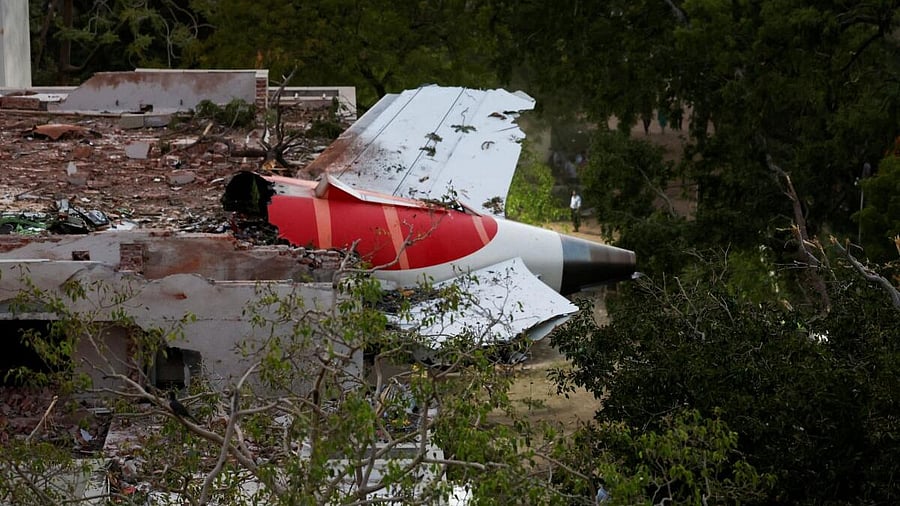
A tail of an Air India Boeing 787 Dreamliner plane that crashed is seen stuck on a building after the incident in Ahmedabad, India, June 12, 2025.
Credit: Reuters File Photo
New Delhi: Headed by the Union Home Secretary, the government appointed high-level multi-disciplinary committee probing the Ahmedabad plane crash have been tasked to ascertain the "root cause" of the accident involving Air India's Dreamliner aircraft and suggest comprehensive guidelines for dealing with such incidents in the future.
It has been given three months' time to submit the report along with access to all records, including flight data, cockpit voice recorders, aircraft maintenance records, ATC log, and witness testimonies. The committee is also allowed to conduct site inspections, interview crew and Air Traffic Controllers, as well as collaborate with international agencies if foreign nationals or manufacturers are involved.
The order issued by the Ministry of Civil Aviation made it clear that the committee "will not be a substitute" to other enquiries being conducted by relevant organisations but will "focus on formulating SOPs for preventing and handling such occurences in the future". The Aircraft Accident Investigation Bureau (AAIB) has already stated its investigations into crash while teams of National Investigation Agency (NIA) and others have visited the accident site.
The committee, set up on Friday, includes the Civil Aviation Secretary, Additional Secretary or Joint Secretary in the Ministry of Home Affairs, representatives from Gujarat Home Department and Gujarat Disaster Response Authority, Ahmedabad Police Commissioner, and Directors General Air Force (Inspection and Safety), Bureau of Civil Aviation Security and Directorate General of Civil Aviation.
The other members of the panel are Intelligence Bureau Special Director, and Director of Directorate of Forensic Science Services and any other member deemed fit by the committee, including aviation experts, accident investigators, and legal advisors.
The objective and scope, as per the Terms and Reference of the Committee, include ascertaining the "root cause" of the crash, as it will assess contributing factors, including "mechanical failure, human error, weather conditions, regulatory compliances and other reasons".
It has been tasked to recommend necessary improvements and formulate suitable SOPs, which include best international practices, to prevent such incidents in the future.
The committee will also assess emergency response of central and state stakeholders, including rescue operations and coordination among them. The panel will examine existing guidelines regarding handling such incidents and go through records of previous crashes for formulating a comprehensive SOP and suggest roles of all agencies to deal with post-crash incident handling and management.
It will also suggest policy changes, operational improvements, and training enhancements required to prevent such occurrences and handle post-crash incident situation.
